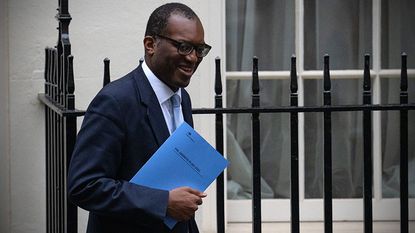Mini-Budget: stamp duty and income tax cut as Kwarteng targets growth
Chancellor Kwasi Kwarteng announced sweeping tax cuts in his mini-Budget statement. Here's what was said.


Chancellor Kwasi Kwarteng announced sweeping tax cuts in his mini-Budget statement. The government’s “Growth Plan” has set a target of reaching a 2.5% rate of economic growth as it tackles a tax burden predicted to reach its highest level since the 1940s.
There had been much speculation, but here’s what he confirmed.
Energy costs
Kwarteng reiterated the government’s plan for tackling high energy prices. Earlier this month prime minister Liz Truss announced the Energy Price Guarantee (EPG), which would see the average household pay £2,500 per year for two years from October 2022. He said this, on top of the Energy Bills Support Scheme which will see all households get £400 over the winter, will save households £1,400 on energy bills for the next year.
Subscribe to MoneyWeek
Subscribe to MoneyWeek today and get your first six magazine issues absolutely FREE

Sign up to Money Morning
Don't miss the latest investment and personal finances news, market analysis, plus money-saving tips with our free twice-daily newsletter
Don't miss the latest investment and personal finances news, market analysis, plus money-saving tips with our free twice-daily newsletter
Bills for businesses, charities and public sector organisations have also been capped.
Kwarteng also said a new “Energy Supply Taskforce” will be put in place to negotiate longer-term agreements with gas producers.
Tax cuts
Kwarteng announced he will be scrapping the 45% top rate of income tax for those earning over £150,000 replacing it with a 40% rate instead. The government is also cutting the basic rate of income tax to 19% in April 2023.
The Bank Corporation Tax Surcharge, which was scheduled to rise from 19% to 25% next April, has also been scrapped to boost investment in the UK. Kwarteng also removed the cap on bankers’ bonuses.
The reversal of the 1.25% rise in National Insurance contributions was confirmed yesterday and reiterated today. The increase was put in place in April by then-chancellor Rishi Sunak. Kwarteng also confirmed the health and social care levy has been scrapped.
In hopes of boosting the tourism sector Kwarteng said he will be introducing a digital VAT-free shopping scheme for tourists “as soon as possible”.
Alcohol duty rates will also be frozen from 1 February 2023, and the levy increase planned for next year has been cancelled.
Investment zones
The government will be setting up new investment zones across the UK, which will benefit from lower taxes, easier planning application permission, increased funding, zero-rate NI employer contributions for certain employees, and stamp duty land tax relief.
Changes to stamp duty
Kwarteng didn’t go so far as to abolish stamp duty, but he did cut stamp duty. From today the government is increasing the threshold above which stamp duty tax has to be paid from £125,000 to £250,000.
First-time buyers will not have to pay tax on the first £425,000 of their house purchase, up from the £300,000 currently. The maximum value of a property on which first-time buyers will get tax relief is also going up from £500,000 to £625,000.
Cuts to universal credit
The government is making changes to Universal Credit to “encourage more people into work”. Those who receive benefits will have to prove they are taking steps to move into a higher paying job or risk having their benefits reduced.
Kwarteng also announced the government will provide additional support to over-50s to get them back into work.
Stamp duty calculator
If you’re buying a house, depending on the transaction price, you may have to still pay some tax. You can work this out using our stamp duty calculator below.
The calculator is not suitable for first-time buyers, those buying non-residential land or property or non-UK residents.
Here are the rates at which stamp duty tax applies:
Up to £250,000 – you‘ll pay 0% on the portion within this band.
From £250,001 to £925,000 – you‘ll pay 5% on the portion within this band.
From £925,001 to £1.5 million – you‘ll pay 10% on the portion within this band.
Over £1.5 million – you‘ll pay 12% on the portion within this band.
Nic studied for a BA in journalism at Cardiff University, and has an MA in magazine journalism from City University. She joined MoneyWeek in 2019.
-
-
 Number of ISA millionaires tops 4,000
Number of ISA millionaires tops 4,000The number of ISA millionaires has surged to more than 4,000 - what does it take to hit the seven-figure sum?
By Katie Binns Published
-
 NS&I August Premium Bonds draw - check from today
NS&I August Premium Bonds draw - check from todayNS&I bond investors can check from today to see if they scooped a prize in this month’s draw. With more than £404m to be handed out in prizes, find out what you won.
By Tom Higgins Published
-
 August NS&I Premium Bond winners unveiled - have you scooped £1m?
August NS&I Premium Bond winners unveiled - have you scooped £1m?Two lucky NS&I Premium Bond winners are now millionaires in the August draw. Find out here if you are one of them
By Tom Higgins Published
-
 Savings rates more than double in a year as challenger banks top the best buy tables
Savings rates more than double in a year as challenger banks top the best buy tablesThe best savings rates have doubled - and in some cases tripled - in a year, with challenger banks offering the highest rates. While they are still no match for inflation, we look at what you could be earning.
By Ruth Emery Published
-
 Midlife MOT: what is it and who can get one?
Midlife MOT: what is it and who can get one?The government has launched an online midlife MOT to help older workers with financial planning, health guidance and career skills. But how does it work, who can get one and would you pass it?
By Ruth Emery Published
-
 Coventry Building Society launches new best easy access savings account
Coventry Building Society launches new best easy access savings accountCoventry Building Society's deal tops our easy access savings account list, but could your cash be put to better use?
By Tom Higgins Published
-
 NS&I boosts fixed-term savings rates
NS&I boosts fixed-term savings ratesThe NS&I, the government-backed savings institution has mirrored recent rate rises seen elsewhere in the market.
By Tom Higgins Published
-
 Should you let AI give you financial advice?
Should you let AI give you financial advice?Can AI fill the financial advice gap? Kalpana Fitzpatrick looks at the pros and cons of using AI to guide your finances.
By Kalpana Fitzpatrick Published
-
 Small pension pots to be consolidated, says DWP
Small pension pots to be consolidated, says DWPWorkplace pension schemes worth less than £1,000 that become “deferred” when a saver changes jobs will be consolidated under a new system
By Ruth Emery Published
-
 Watchdog summons banks to explain paltry savings rates
Watchdog summons banks to explain paltry savings ratesSavings rates trail mortgage rates - and the financial watchdog has summoned banks to a meeting amid concerns of profiteering.
By Katie Binns Last updated









